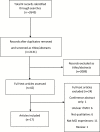Living With Ambiguity: A Metasynthesis of Qualitative Research on Mild Cognitive Impairment
- PMID: 26315317
- PMCID: PMC4580312
- DOI: 10.1093/geront/gnv067
Living With Ambiguity: A Metasynthesis of Qualitative Research on Mild Cognitive Impairment
Abstract
Purpose of the study: Mild Cognitive Impairment (MCI) is a diagnosis proposed to describe an intermediate state between normal cognitive aging and dementia. MCI has been criticised for its conceptual fuzziness, its ambiguous relationship to dementia, and the tension it creates between medical and sociological understandings of "normal aging".
Design and methods: We examined the published qualitative literature on experiences of being diagnosed and living with MCI using metasynthesis as the methodological framework.
Results: Two overarching conceptual themes were developed. The first, MCI and myself-in-time, showed that a diagnosis of MCI could profoundly affect a person's understanding of their place in the world. This impact appears to be mediated by multiple factors including a person's social support networks, which daily activities are affected, and subjective interpretations of the meaning of MCI. The second theme, Living with Ambiguity, describes the difficulties people experienced in making sense of their diagnosis. Uncertainty arose, in part, from lack of clarity and consistency in the information received by people with MCI, including whether they are even told MCI is the diagnosis.
Implications: We conclude by suggesting an ethical tension is always at play when a MCI diagnosis is made. Specifically, earlier support and services afforded by a diagnosis may come at the expense of a person's anxiety about the future, with continued uncertainty about how his or her concerns and needs can be addressed.
Keywords: Attitudes and perception toward aging/aged; Cognition; Dementia; Ethics (research, practice, policy, individual choices); Qualitative research methods; Sociology of aging/social gerontology; Well-being.
© The Author 2015. Published by Oxford University Press on behalf of The Gerontological Society of America.
References
-
- Albert M. S. DeKosky S. T. Dickson D. Dubois B. Feldman H. H. Fox N. C.…Phelps C. H (2011). The diagnosis of mild cognitive impairment due to Alzheimer’s disease: Recommendations from the National Institute on Aging-Alzheimer’s Association workgroups on diagnostic guidelines for Alzheimer’s disease. Alzheimer’s & Dementia, 7, 270–279. doi:10.1016/j.jalz.2011.03.008 - PMC - PubMed
-
- Allen J. O. (2015). Ageism as a risk factor for chronic disease. The Gerontologist. doi:10.1093/geront/gnu158 - PubMed
-
- American Psychiatric Association. (2013). The diagnostic and statistical manual of mental disorders: DSM 5. Arlington, VA: BookpointUS.
-
- Artero S. Ancelin M. L. Portet F. Dupuy A. Berr C. Dartigues J. F.…Ritchie K (2008). Risk profiles for mild cognitive impairment and progression to dementia are gender specific. Journal of Neurology, Neurosurgery, and Psychiatry, 79, 979–984. doi:10.1136/jnnp.2007.136903 - PubMed
-
- Banningh J. W. L. Vernooij‐Dassen M. Rikkert M. O., & Teunisse J. P (2008). Mild cognitive impairment: Coping with an uncertain label. International Journal of Geriatric Psychiatry, 23, 148–154. doi:10.1002/gps.1855 - PubMed
Publication types
MeSH terms
Grants and funding
LinkOut - more resources
Full Text Sources
Other Literature Sources
Medical
Research Materials


